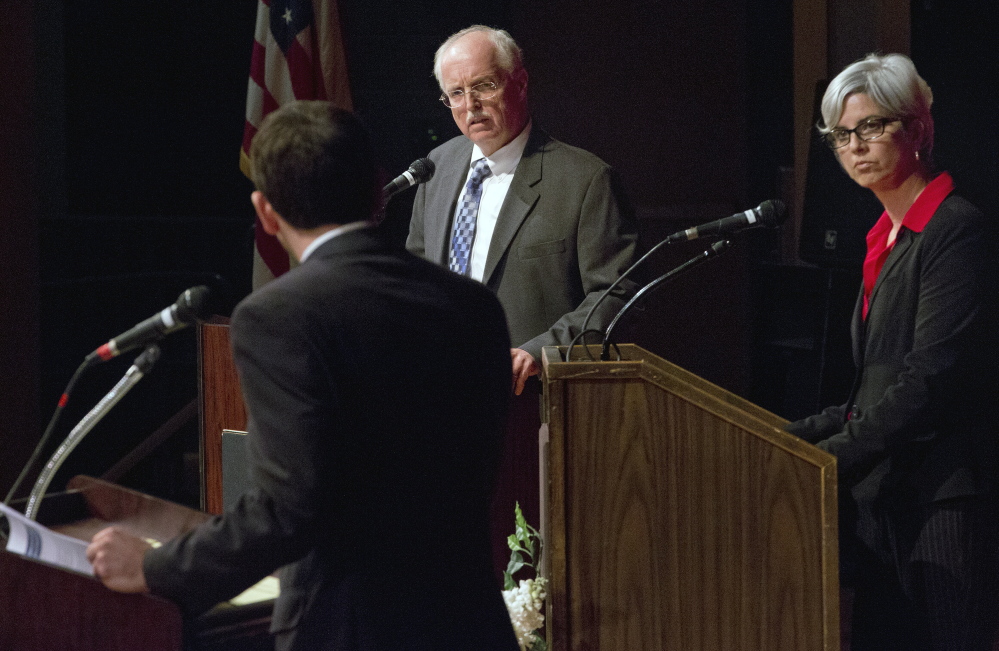SOUTH PORTLAND — The issue of whether marijuana is safer than alcohol took center stage Wednesday at a debate over an upcoming vote on whether to legalize recreational marijuana use in South Portland.
Police Chief Edward Googins, a vocal opponent and David Boyer, Maine political director of the Marijuana Policy Project, sparred over the proposal, which would legalize possession of small amounts of the drug for adults. Lewiston voters will also be deciding next month whether to legalize recreational pot use.
Googins acknowledged that problems arise from alcohol use even though it is legal, but said that does not somehow make marijuana use safer. He said police most often cite people for marijuana possession when they are involved in other criminal activity. He said legalizing recreational marijuana “defies logic.”
“Marijuana and other drug use and abuse are intertwined with most criminal incidents we investigate,” he said. “It is not a harmless drug. It is addictive.”
Boyer, however, argued that marijuana use is safer than alcohol, which is attributed to 37,000 deaths nationally each year, according to the U.S. Centers for Disease Control and Prevention. No deaths have been attributed to marijuana overdoses, he said.
“Despite this potential harm of alcohol, most would agree adults should be able to responsibly use alcohol. Why should an adult of age to consume alcohol be prohibited from using or from possessing marijuana?” Boyer said. “It’s time to move beyond ‘Reefer Madness’ and pass laws that make sense.”
Both Googins and Boyer said they want to make sure marijuana stays out of the hands of children and teens, but Googins said legalization would normalize its use in the community and make it easier for kids to get their hands on it. He said a South Portland officer recently caught a teenager who had his father’s medical marijuana.
“(Marijuana) use by adults makes it seem normal for kids and increases access,” he said. “I do not want to see marijuana more accessible to youth in our community. We need to set an example for them.”
Boyer, however, said adults must recognize that marijuana is already circulating in the community and that teens buy it from drug dealers who also have other drugs. A better approach would be to allow adults to purchase marijuana through licensed and regulated businesses, while focusing on preventing pot use among teenagers, he said.
“I don’t think kids should use marijuana,” he said. “We need to be honest with our kids. Being dishonest with our kids and telling them alcohol is safer than marijuana is dangerous.”
The proposals in South Portland and Lewiston would allow adults 21 and older to legally possess up to an ounce of marijuana for recreational use. The two proposals also includes resolutions urging the state to tax and regulate marijuana like alcohol.
Last year Portland became the first city on the East Coast to legalize recreational pot when it passed a similar ordinance. That vote remains largely symbolic, however, because marijuana remains illegal under state and federal law.
Legalization advocates say the South Portland and Lewiston votes will help gauge public sentiment ahead of an anticipated statewide referendum in 2016.
Wednesday’s debate was hosted by the South Portland High School social studies department as a service to the community, said teacher and organizer Tom Major. Close to 100 people attended the hourlong debate.
Both the South Portland City Council and School Board have passed nonbinding resolutions opposing the ordinance. The school board resolution cited research showing that heavy use of marijuana by adolescents is linked to increased cases of psychotic, mood and anxiety disorders, as well as problems with attention, learning and memory.
It also cited results from the 2013 Maine Integrated Youth Health Survey indicating that 27.5 percent of South Portland High School students reported using marijuana in the past 30 days, and 22.6 percent of the city’s middle school students and 64.7 percent of its high school students believe there is “no risk” or only a “slight risk” from regular marijuana use.
“What kind of message are we sending if we say it’s OK for us, but not for you,” Googins said.
During his remarks, Boyer repeatedly cited studies that show marijuana is less harmful than alcohol, including a 2005 report from the University of Oxford that concluded that long-term marijuana use does not cause lasting physical or mental harm.
“The social costs of alcohol and tobacco are very different than marijuana. These things kill people and marijuana doesn’t,” Boyer said. “We’re forcing marijuana consumers into an underground market.”
Copy the Story LinkSend questions/comments to the editors.




Success. Please wait for the page to reload. If the page does not reload within 5 seconds, please refresh the page.
Enter your email and password to access comments.
Hi, to comment on stories you must . This profile is in addition to your subscription and website login.
Already have a commenting profile? .
Invalid username/password.
Please check your email to confirm and complete your registration.
Only subscribers are eligible to post comments. Please subscribe or login first for digital access. Here’s why.
Use the form below to reset your password. When you've submitted your account email, we will send an email with a reset code.